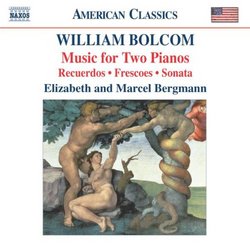| All Artists: William Bolcom, Elizabeth Bergmann, Marcel Bergmann Title: William Bolcom: Music for Two Pianos Members Wishing: 0 Total Copies: 0 Label: Naxos American Original Release Date: 1/1/2005 Re-Release Date: 11/15/2005 Genre: Classical Styles: Chamber Music, Forms & Genres, Short Forms, Historical Periods, Classical (c.1770-1830), Instruments, Keyboard Number of Discs: 1 SwapaCD Credits: 1 UPC: 636943924426 |
Search - William Bolcom, Elizabeth Bergmann, Marcel Bergmann :: William Bolcom: Music for Two Pianos
 | William Bolcom, Elizabeth Bergmann, Marcel Bergmann William Bolcom: Music for Two Pianos Genre: Classical
|
Larger Image |
CD Details |
CD ReviewsAmerica's Musical Magpie J Scott Morrison | Middlebury VT, USA | 11/16/2005 (5 out of 5 stars) "William Bolcom is one of the most innately talented composers working today. His enormous output varies wildly in quality and style -- rather like that of his erstwhile composition teacher, Darius Milhaud -- but when he is at the top of his form, which is often, he cannot be beat. His evening-long orchestral song cycle (cantata?, extravaganza?) 'Songs of Innocence and of Experience' is one of the true masterpieces of our age. This disc demonstrates his varied styles as well as his varied quality of output. The talented duo-pianists, Elizabeth and Marcel Bergmann, have put together a program that includes works from his very earliest (and academic) style through his more recent masterly incorporation of multiple styles in one work. In the former category is the brief Schoenbergian 'Interlude' from the early 1960s. 'Frescoes', written slightly later, features tone clusters, aleatoric passages, inside-the-piano tone production and passages where the two pianists are intentionally out of synchronization. The thing that saves this rather tired set of gestures (tired, that is, from a 21st century vantage point) is Bolcom's wit, his always inventive and engaging use of varied rhythm and, even in the most solemn moments, a lack of self-regarding pomposity. The effects are enhanced by the composer having his pianists also play harmonium and harpsichord in several passages.
Much more agreeable to my ears are the remaining works. The absolutely lovable 'Recuerdos' ('Reminiscences') are three homages to American composers. Chôro (Homage to Ernesto Nazareth), Pasco (à la mémoire de Louis-Moreau Gottschalk), and Valse Venezolano (à la mémoire de Ramón Delgado Palacios) should feature prominently on two-piano programs. They are written in the various styles of their dedicatees and are such expert pastiches that one is agape with admiration. (Plus, they're simply beautiful.) There are two rags from Bolcom's suite 'The Garden of Eden' (which comprises four rags telling the story of The Fall, originally for solo piano). These two, arranged by Bolcom for two pianos, are the third and fourth rags. The Serpent's Kiss, and Through Eden's Gates (Cakewalk) are among the many modern rags written by Bolcom. His ability to write in any style is legend, but when he began writing 'modern rags' some thirty years ago, he had found a genre in which he excelled. The Bergmanns' handling of the subtle syncopations is expert and infectious. In 'The Serpent's Kiss' I swear I hear a direct quote from 'Gee, Officer Krupke' from 'West Side Story'! And like Scott Joplin sometimes required in his rags, the pianists must stomp their feet, knock on the wood of the piano and make tongue-clicks. Is it Adam and Eve cocking a snook at their fate with those clucking tongues? I particularly like the second of the two; as Bolcom describes it, it 'conjures the magic of Adam and Eve calmly cakewalking their way out of Paradise.' Delicious! The Sonata for Two Pianos is a fifteen-minute work from 1993. In an easy-to-take eclectic style that varies from atonality to a sexy blues to overt and varied quotations from Debussy and Schoenberg, it has a logic of its own and a formal organization that sustains its length through three movements (played without pause) called Gaia, Night Diversion and Ancient Dances. It was written for the Paratore Brothers, but I don't recall hearing a previous recording. It is definitely an addition to 'serious' two-piano literature. Bolcom is truly a musical magpie, collecting shiny bits of musical style here and there and using them to feather his compositional nest. In these days of eclecticism, of 'anything goes,' he is a master. TT: 72:15 Scott Morrison" |

 Track Listings (9) - Disc #1
Track Listings (9) - Disc #1